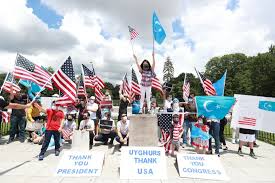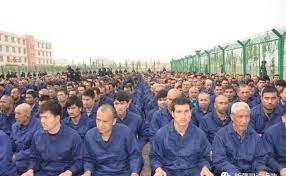Human Rights and Supply Chain Risks: The Uyghur Forced Labor Prevention Act (Part II of II)

The Volkov Law Group is pleased to publish this blog article written by our summer intern Victoria Rinn, a rising junior at Cornell University. After researching the law and attending a U.S. Customs and Border Protection webinar on June 16, 2022, Victoria discusses the Uyghur Forced Labor Prevention Act, which took effect on June 21, 2022, and the impact on private companies’ supply chains.
On December 21, 2021, President Joe Biden signed into law legislation entitled the Uyghur Forced Labor Prevention Act (“UFLPA”), which came into effect on June 21, 2022. In relevant part, the law prohibits certain imports from China’s Xinjiang Uyghur autonomous region (“XUAR”) or certain entities identified by the U.S. government on the UFLPA Entity List. The law creates a “rebuttable presumption” that all goods partially or wholly produced in the region are “tainted by forced labor” and may not enter the U.S. unless the U.S. Customs and Border Protection (“CBP”) determines that the importer of record can demonstrate, through “clear and convincing evidence,” that the goods were not made by forced labor. Importers must consult the June 17, 2022, Strategy to Prevent the Importation of Goods Mined, Produced, or Manufactured with Forced Labor in the People’s Republic of China (“UFLPA Strategy”), published by the Department of Homeland Security (“DHS”), in its role as the chair of the Forced Labor Enforcement Task Force (“FLETF”), for specific importer guidance.
According to the recently released CBP Guidance, in addition to complying with the FLETF guidance, importers must “respond to all CBP requests for information about merchandise under CBP review and demonstrate by clear and convincing evidence that the good, ware, article, or merchandise was not mined, produced, or manufactured wholly or in part by forced labor. … The UFLPA also requires that importers demonstrate due diligence, effective supply chain tracing, and supply chain management measures to ensure that they do not import any goods made, in whole or in part, by forced labor, especially from the Xinjiang Region. This requirement extends throughout the entire supply chain, including goods that may be shipped elsewhere in the PRC and to third countries for further processing.” As such, the law significantly burdens private companies to conduct internal risk assessments and supply chain due diligence.

The CBP Guidance, UFLPA Strategy provide an outline of broad categories of information that CBP likely will require if an importer requests an exception, including:
- Documentation showing a due diligence system or process and supply chain tracing (e.g., a written supplier code of conduct, supply chain mapping and assessment, training, monitoring, remediation);
- Documentation tracing the supply chain from raw materials to the imported good;
- Documentation on supply chain management measures (e.g., internal controls);
- Documentation that traces the supply chain for the goods and demonstrates that the goods were not mined, produced, or manufactured wholly or in part in the XUAR; and
- Documentation that goods originating anywhere in China were not mined, produced, or manufactured wholly or in part by forced labor.
See also the U.S. Department of Labor’s Comply Chain. Importers who suspect this legislation will impact them (e.g., importers of commodities with a high risk of forced labor, such as cotton, polysilicon, and tomatoes) will want to be sure to obtain and retain all of the foregoing, necessary documentation.
The CBP provided more information about the UFLPA during a webinar held on June 16, 2022. With an emphasis on the CBP’s role when the UFLPA comes into force, the webinar highlighted the critical part of the FLETF, the rebuttable presumption within the UFLPA, and UFLPA enforcement actions.
During the webinar, many participants voiced their concerns surrounding the rebuttable presumption’s implementation and the necessary actions to ensure industries and businesses continue without undue disruption to their supply chains. Unfortunately for some participants, the CBP’s response echoed the written law in the UFLPA: the rebuttable presumption applies to any goods, wares, articles, or merchandise mined, produced, or manufactured wholly or in part in the XUAR or by an entity flagged by the FLETF, with exceptions determined by the CBP. The panelists repeatedly underscored the burden on the importers to ensure the locations and compliance measures of their entire supply chain.

Imports subject to the UFLPA’s rebuttable presumption follow the typical detention process outlined in Section 499 of the Tariff Act of 1930 (19 U.S.C. 1499). Based on the identified risk of a shipment, the CBP will detain, exclude, or seize shipments subject to the presumption. In a severe situation, such as an importer evading prohibition or falsifying a shipment’s place of origin, the CBP may require a seizure; however, the CBP emphasized that most imports will be detained or excluded under the UFLPA’s rebuttable presumption. CBP emphasized that it will only grant an exception if an importer has:
- Complied with the guidance within the FLETF’s strategy;
- Completely and substantially responded to all CBP inquiries; and
- Provided clear and convincing evidence that goods are not wholly or in part manufactured with forced labor, which must conform with Section 3B and comply with Section 2D(6) of the UFLPA.
Notably, CBP exceptions must be reported to Congress and are subject to public disclosure.
The two main takeaways from the panelist responses during the participant question portion of the webinar were: (1) importers have an affirmative duty to ensure their supply chain is rid of goods manufactured by slave labor in the XUAR, and (2) the UFLPA is neither retroactive nor confined to a certain threshold. If an import containing goods made in the XUAR is currently under a withhold release order (“WRO”), that import will be subsumed under the UFLPA on June 21, 2022, when the law goes into full force, and there will be no grace period. Some news outlets report that CBP has already seized a shipment of products made by the U.S.-based shoe company Skechers on suspicion that their goods were manufactured through slave labor in XUAR.
Many panelists expressed concerns regarding access to the UFLPA’s entity list to ensure their businesses would not be affected. The panelists encouraged participants to validate their entire supply chain. And the CPB emphasized, per the UFLPA, that it will enforce the prohibition for all goods made in XUAR, regardless of quantity.
In conclusion, companies that haven’t already done so should review and validate their entire supply chain to ensure compliance with the new guidance and to ensure their supply chain is void of goods made with forced labor in the XUAR. Additionally, it would be wise for companies to gather clear and convincing evidence to provide the CBP in case their imports are wrongfully detained.















1 Response
[…] Source link […]